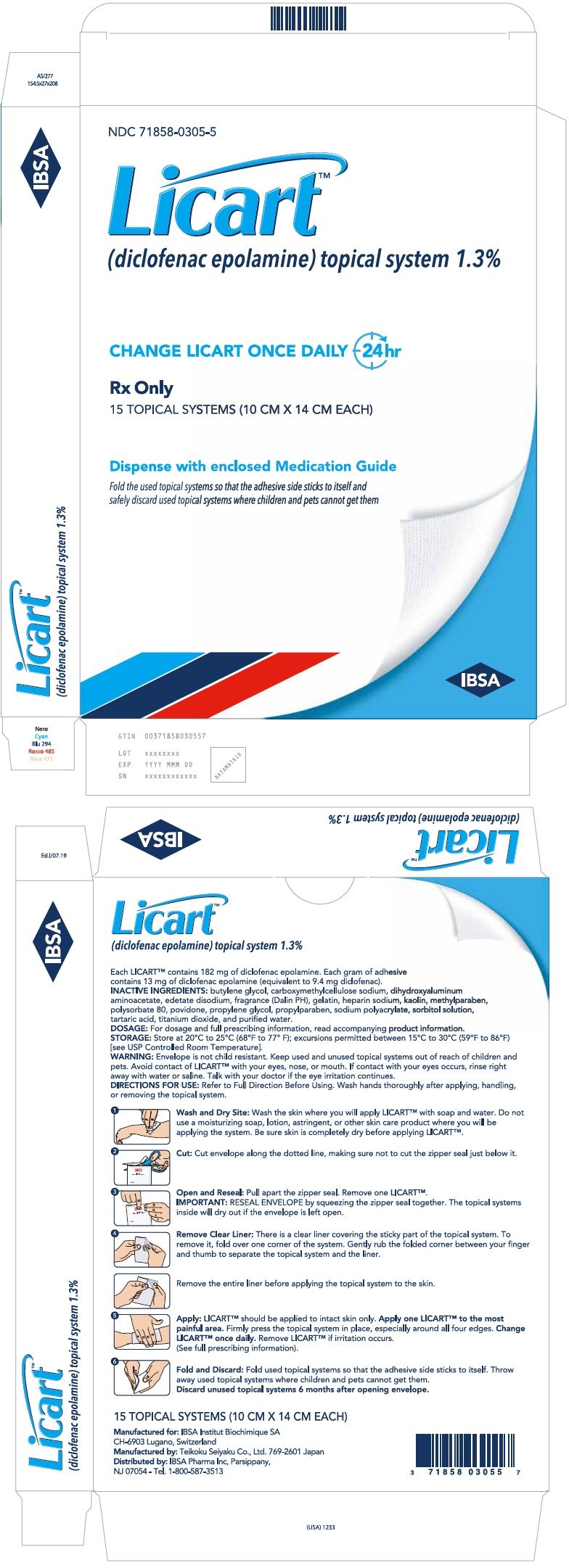
Contents
Licart
Licart is a topical NSAID (non-steroidal anti-inflammatory drug) used to treat pain, redness, swelling, and inflammation caused by conditions like arthritis, menstrual cramps, and short-term pain.
Warnings
Cardiovascular Thrombotic Events
- NSAIDs increase the risk of serious cardiovascular thrombotic events, including heart attack and stroke, which can be fatal. This risk may occur early in treatment and may increase with prolonged use.
- Licart is contraindicated in patients who have had coronary artery bypass graft (CABG) surgery.
Gastrointestinal Bleeding, Ulceration, and Perforation
NSAIDs increase the risk of serious gastrointestinal (GI) adverse events, including bleeding, ulceration, and perforation of the stomach or intestines, which can be fatal. These events can occur without warning symptoms at any time during use. Elderly patients and those with a history of peptic ulcer disease and/or GI bleeding are at higher risk.
Drug Reaction with Eosinophilia and Systemic Symptoms (DRESS)
- DRESS has been reported in patients taking NSAIDs like Licart. Some of these events have been fatal or life-threatening.
Fetal Toxicity
- Avoid using NSAIDs, including Licart, after approximately 30 weeks of pregnancy. NSAIDs increase the risk of premature closure of the fetal ductus arteriosus around this gestational age.
- Using NSAIDs, including Licart, at approximately 20 weeks of pregnancy or later may cause fetal renal dysfunction leading to oligohydramnios (low amniotic fluid) and, in some cases, neonatal renal impairment. These adverse outcomes may occur after days to weeks of treatment and can have long-term complications.
- In rare cases of impaired neonatal renal function, invasive procedures such as exchange transfusion or dialysis may be required. If NSAID treatment is necessary between 20 and 30 weeks of pregnancy, use the lowest effective dose and shortest duration possible. Consider ultrasound monitoring of amniotic fluid if Licart treatment extends beyond 48 hours. Discontinue Licart if oligohydramnios occurs and follow up according to clinical practice.
What are the side effects of Licart?
Licasrt can cause serious side effects, including:
- new or worse high blood pressure
- heart failure
- liver problems including liver failure
- kidney problems including kidney failure
- low red blood cells (anemia)
- life-threatening skin reactions
- life-threatening allergic reactions
Other side effects of NSAIDs include:
Get emergency help right away if you experience any of the following symptoms:
- shortness of breath or trouble breathing
- chest pain
- weakness in one part or side of your body
- slurred speech
- swelling of the face or throat
Stop taking Licart and call your healthcare provider immediately if you experience any of the following symptoms:
- nausea
- unusual fatigue or weakness
- diarrhea
- itching
- yellowing of the skin or eyes
- indigestion or stomach pain
- flu-like symptoms
- vomiting blood
- blood in your bowel movement or black, tar-like stool
- unusual weight gain
- skin rash or blisters with fever
- swelling of the arms, legs, hands, and feet
If you take too much Licart, call your healthcare provider or seek medical help right away.
Call your doctor immediately if you experience any of the following symptoms or serious side effects while using this drug:
- Serious heart symptoms such as rapid or pounding heartbeats, fluttering in the chest, shortness of breath, and sudden dizziness;
- Severe headache, confusion, slurred speech, severe weakness, vomiting, loss of coordination, feeling unsteady;
- Severe nervous system reaction with very stiff muscles, high fever, sweating, confusion, rapid or irregular heartbeats, tremors, and feeling like you might faint; or
- Serious eye symptoms such as blurred vision, tunnel vision, eye pain or swelling, or seeing halos around lights.
This is not a complete list of all side effects or adverse reactions that may occur from using this drug. Call your doctor for medical advice about serious side effects or adverse reactions. You may also report side effects or health problems to the FDA at 1-800-FDA-1088.
What is the dosage for Licart?
Important Dosage and Administration Information
Use the lowest effective dosage for the shortest duration needed.
Licart is intended for topical use only.
Convey the following important administration instructions to the patient:
- If Licart begins to peel off, the edges of the topical system may be taped down. If adhesion problems persist, patients may overlay the topical system with a mesh netting sleeve, where appropriate. The mesh netting sleeve must allow air to pass through and not be occlusive (non-breathable).
- Do not apply Licart to non-intact or damaged skin resulting from any cause, such as dermatitis, eczema, infections, burns, or wounds.
- Do not wear a Licart topical system while bathing or showering.
- Wash your hands after applying, handling, or removing the topical system.
- Avoid contact with eyes.
- Do not use Licart in combination with an oral NSAID unless directed by a healthcare provider and periodic laboratory evaluations are conducted.
Recommended Dose
The recommended dose is one Licart topical system applied to the most painful area once daily.
QUESTION
What drugs interact with Licart?
Inform your doctor of all medications you are currently taking as they can advise you on possible drug interactions. Do not begin, discontinue, or change the dosage of any medication without your doctor’s recommendation.
See Table 2 for clinically significant drug interactions with diclofenac.
Table 2: Clinically Significant Drug Interactions with Diclofenac
- Diclofenac and anticoagulants such as warfarin have a synergistic effect on bleeding. The concomitant use of diclofenac and anticoagulants increases the risk of serious bleeding compared to either drug alone.
- Concomitant use of drugs that interfere with serotonin reuptake and an NSAID may potentiate the risk of bleeding more than an NSAID alone.
- During concomitant use of Licart and ACE-inhibitors, angiotensin receptor blockers (ARBs), or beta blockers, monitor blood pressure to ensure desired levels.
- During concomitant use of Licart and ACE-inhibitors or ARBs in elderly patients, volume-depleted patients, or those with impaired renal function, monitor signs of worsening renal function. Adequate hydration should be maintained when administering these drugs together. Assess renal function when starting concomitant treatment and periodically thereafter.
The drug interactions listed above are not exhaustive. For more information on drug interactions, consult the RxList Drug Interaction Checker.
Always inform your doctor, pharmacist, or healthcare provider about all prescription and over-the-counter medications you use, including the dosage for each. Keep a list of this information and consult your healthcare provider if you have any questions about your medication.
Pregnancy and breastfeeding
- Using NSAIDs, including Licart, after approximately 30 weeks of pregnancy increases the risk of premature closure of the fetal ductus arteriosus.
- Data on the potential risks of NSAID use, including diclofenac (the active ingredient in Licart), during the first or second trimester of pregnancy are inconclusive.
- Avoid using NSAIDs, including Licart, starting at 30 weeks of pregnancy (third trimester).
- Small amounts of diclofenac have been found in human milk in studies with oral preparations. It is unknown whether Licart can affect the breastfed infant or milk production.
- The decision to use Licart during breastfeeding should consider the benefits of breastfeeding along with the clinical need for Licart and potential adverse effects on the infant.
Summary
Licart is a topical NSAID used to treat pain, redness, swelling, and inflammation caused by conditions like arthritis, menstrual cramps, and short-term pain. Serious side effects of Licart include risk of serious cardiovascular and gastrointestinal events, which can be fatal.


